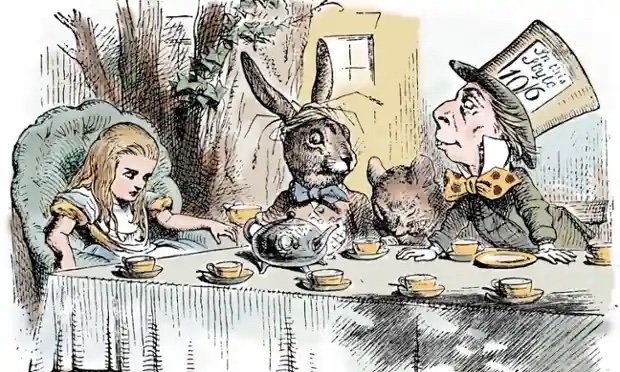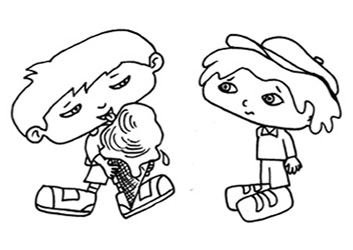KNOWLEDGE AND THE KNOWER—PERSPECTIVES
WHAT DO LITTLE KIDS KNOW?
The Mad Hatter’s Tea Party from Lewis Carroll’s Alice in Wonderland.
Image credit: Print Collector/Getty Images
This popular unit of inquiry involves a field trip to a Preschool class. If this is not practicable students can perform the protocol at home with a three or four year old relative or acquaintance. The unit provides a first-hand snapshot of some long forgotten and unexamined cognitive milestones of early childhood.
CLASS ACTIVITY
Prior to visiting the children, the TOK students are grouped into threes. Sets of apparatus are prepared and a scribe is appointed. Recording the responses of the small children will provide data for our discussion. After the visit groups will be called upon to report on their findings. Some precise anecdotes and verbatim responses from the younger children will be required.
1. CONSERVATION OF QUANTITY
Two sets of seven identical objects are arranged in two lines; one of the lines is significantly more spaced out than the other. The groups small children are asked, "Which is more?" The spacing of the lines should be reversed unhurriedly, in full view of the children, and the question repeated.
2. CONSERVATION OF VOLUME
Two wide beakers are filled with identical quantities of water. The children are asked "Which one has more?" Next beaker A is set aside and the contents of beaker B is poured carefully into a tall, thin measuring cylinder. The measuring cylinder and beaker A are placed side by side and the children are asked again "Which one has more?" Repeat until interest wains.
3. AN OPTICAL ILLUSION
Instruct the children, in turn, to "Count how many legs!" This should unleash some lively responses and possible bewilderment. Printable pdf.
4. ETHICAL CARTOONS
The five-year-olds are shown a sequence of cartoons depicting age-appropriate, non-scary ethical situations. TOK students ask them “Is this Good, or Bad?” “Why?”
Ethical cartoons by Mara Lea Brown (2009) printable pdf
GENERATIVE QUESTIONS
What happened? Were any initial assumptions or prejudgments about the children shattered? TOK students are usually fired up and ready to share their results and experiences after the classroom visit. The following guiding questions may or may not be necessary to solicit discussion of knowledge issues:
Why did we standardize the questions?
Were any of the responses of the children swayed by authority?
Did we notice any peer pressure effects?
Did the phrasing of the questions influence the data?
What if anything can we conclude about developmental aspects of acquiring an ethical sensibility?
Did the children learn everything that they know by experience? Justify your response.
Imagine what would have occurred had you encountered a child who had been raised without human interaction?
What have you learned today about your own knowing and the march of time?
Students will be primed to tackle the oOctopus intelligence, Sentience continuum, and Feral children units.
““Curiouser and curiouser!” Cried Alice (she was so much surprised, that for the moment she quite forgot how to speak good English).””







